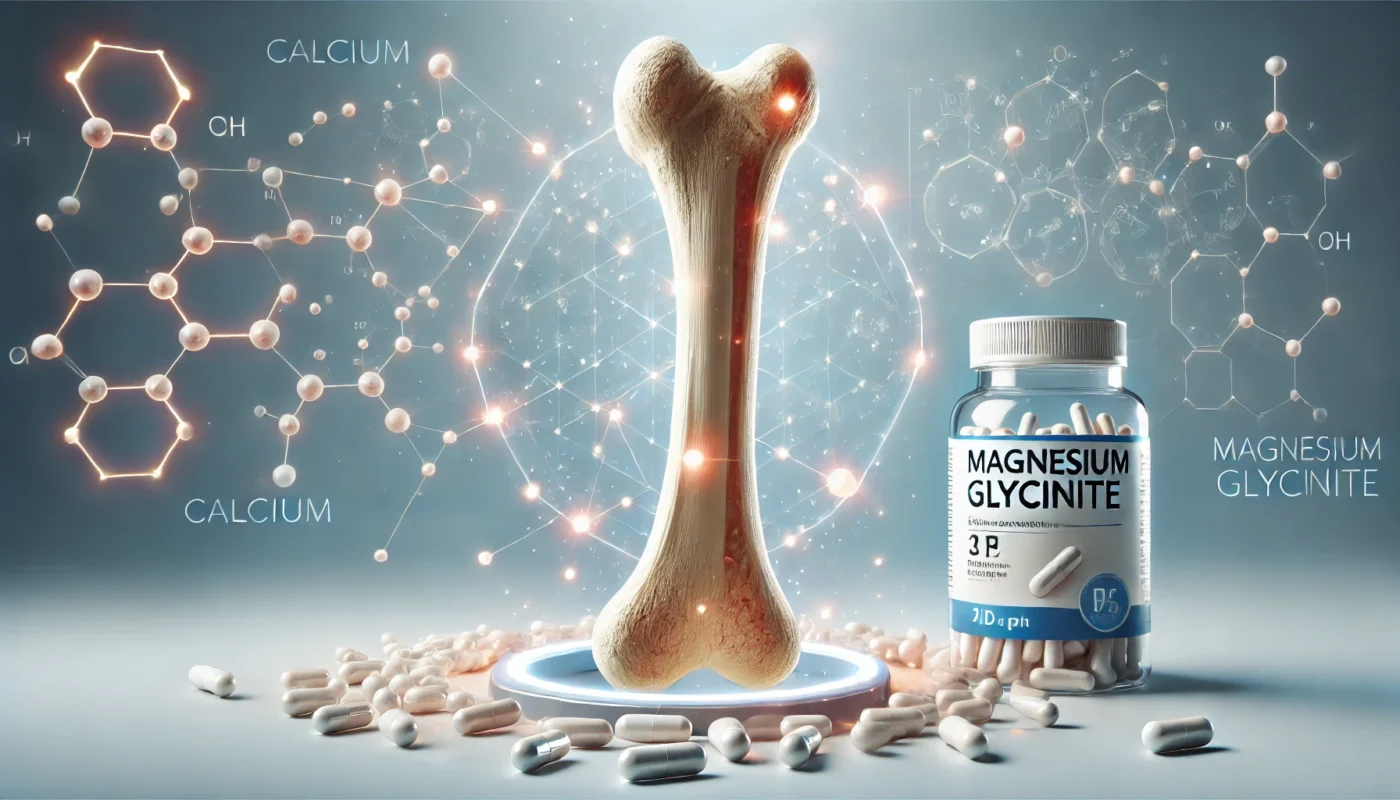Bone health is a cornerstone of overall well-being, particularly as individuals age and the risk of conditions like osteoporosis increases. Calcium is often heralded as the essential mineral for strong bones, but magnesium plays an equally critical—yet frequently overlooked—role in bone health. Magnesium glycinate, a highly bioavailable form of magnesium, not only enhances calcium absorption but also supports the development and maintenance of healthy bone tissue. This article delves into the unique contributions of magnesium glycinate to bone density and explores why it is more than just calcium’s companion.
You May Also Like:
Can Magnesium Glycinate Accelerate Bone Graft Integration? Here’s What to Know
Can Magnesium Glycinate Help Prevent Bone Spurs? What Research Says
The Importance of Bone Health
Bone Structure and Function
Bones provide structural support, protect vital organs, and house bone marrow, where blood cells are produced. They also act as a reservoir for minerals, particularly calcium and magnesium, which are crucial for maintaining skeletal integrity.
Prevalence of Bone-Related Conditions
Osteoporosis affects approximately 10 million adults in the United States, with another 44 million at risk due to low bone density (National Osteoporosis Foundation, 2021). This condition is associated with an increased risk of fractures, reduced mobility, and diminished quality of life. Addressing nutrient deficiencies is a key strategy for preventing and managing bone-related disorders.

What Is Magnesium Glycinate?
Magnesium glycinate is a chelated form of magnesium in which the mineral is bound to glycine, an amino acid. This formulation enhances magnesium’s absorption in the digestive tract while minimizing gastrointestinal side effects such as diarrhea, which are common with other forms of magnesium.
Key Benefits of Magnesium Glycinate
- High Bioavailability: Studies show that magnesium glycinate is one of the most absorbable forms of magnesium, ensuring efficient delivery to tissues, including bones (Walker et al., 2018).
- Gentle on the Stomach: Unlike magnesium oxide or magnesium citrate, magnesium glycinate is less likely to cause gastrointestinal discomfort.
- Dual Benefits from Glycine: Glycine itself supports collagen formation, an essential component of bone structure.
Magnesium’s Role in Bone Health
1. Enhancing Calcium Absorption and Utilization
Magnesium is a cofactor for many enzymes involved in calcium metabolism. It activates vitamin D, a hormone essential for calcium absorption in the intestines. Without sufficient magnesium, vitamin D remains inactive, impairing calcium uptake. A study in The Journal of the American Osteopathic Association found that magnesium deficiency reduces the body’s ability to absorb calcium by 50% (Uwitonze & Razzaque, 2018).
Moreover, magnesium regulates parathyroid hormone (PTH), which maintains calcium balance in the blood and bones. A deficiency in magnesium can disrupt PTH activity, leading to calcium being leached from bones and increasing the risk of osteoporosis.
2. Building Bone Matrix
Magnesium directly contributes to the formation of hydroxyapatite, the mineralized structure that gives bones their strength and rigidity. It also influences the activity of osteoblasts (bone-building cells) and osteoclasts (bone-resorbing cells). Balanced magnesium levels favor osteoblast activity, promoting bone formation.
3. Preventing Calcification of Soft Tissues
Inadequate magnesium can lead to the deposition of calcium in soft tissues, such as arteries and joints, rather than in bones. This not only weakens bones but also increases the risk of cardiovascular disease and joint dysfunction.

Magnesium Glycinate and Bone Density: Clinical Evidence
Magnesium Intake and Bone Density
A longitudinal study published in Bone (2017) assessed the relationship between magnesium intake and bone mineral density (BMD) in over 2,500 participants. The results showed that individuals with higher magnesium intake had significantly greater BMD in the hip and spine compared to those with lower intake (Ryder et al., 2017). This underscores magnesium’s critical role in maintaining bone strength.
Combination Therapy with Calcium and Vitamin D
Magnesium’s role in bone health is most effective when paired with calcium and vitamin D. A randomized controlled trial in Osteoporosis International demonstrated that individuals receiving a combination of magnesium, calcium, and vitamin D supplementation had a 15% greater improvement in BMD compared to those taking calcium and vitamin D alone (Zhu et al., 2018).
Effect on Fracture Risk
A meta-analysis in Nutrients found that adequate magnesium intake was associated with a 27% lower risk of fractures in older adults (Rosanoff et al., 2020). This protective effect is likely due to magnesium’s ability to improve bone quality and reduce the likelihood of falls by enhancing muscle function.
Synergy Between Magnesium Glycinate and Other Nutrients
Magnesium and Calcium
Magnesium helps regulate calcium homeostasis, ensuring that calcium is deposited in bones rather than soft tissues. However, excessive calcium intake without sufficient magnesium can lead to calcium imbalances. The ideal magnesium-to-calcium ratio is 1:2, emphasizing the need for balanced supplementation.
Magnesium and Vitamin D
Magnesium is essential for activating vitamin D, which in turn promotes calcium absorption and bone mineralization. Without magnesium, even high levels of vitamin D supplementation may be ineffective.
Magnesium and Collagen
Collagen forms the framework for bone tissue, upon which minerals like calcium and magnesium are deposited. Glycine, a component of magnesium glycinate, supports collagen synthesis, further enhancing bone strength and flexibility.

Factors Contributing to Magnesium Deficiency
Dietary Deficiency
Magnesium deficiency is common, with surveys indicating that up to 48% of Americans consume less than the recommended daily allowance (National Institutes of Health, 2021). Processed foods, which are low in magnesium, dominate modern diets, exacerbating this deficiency.
Aging
As individuals age, magnesium absorption decreases while urinary excretion increases. Older adults are therefore at a higher risk of magnesium deficiency, which contributes to age-related bone loss.
Chronic Diseases
Conditions such as diabetes, kidney disease, and gastrointestinal disorders can impair magnesium absorption or increase its excretion.
Dosage and Safety of Magnesium Glycinate for Bone Health
Recommended Dosage
- The recommended dietary allowance (RDA) for magnesium is 310–420 mg per day for adults, depending on age and sex.
- For individuals with low bone density or at risk of osteoporosis, supplementation with 200–400 mg of magnesium glycinate daily is often recommended.
Safety Considerations
- Magnesium glycinate is generally safe and well-tolerated.
- Excessive intake may cause mild gastrointestinal side effects, such as loose stools.
When to Supplement
Magnesium glycinate can be taken at any time of day, but consuming it with meals may improve absorption. Evening supplementation may also promote relaxation and better sleep.

Practical Tips for Optimizing Bone Health
- Combine Magnesium with Other Bone-Healthy Nutrients
Pair magnesium glycinate with calcium, vitamin D, and vitamin K2 for comprehensive bone support. - Adopt a Magnesium-Rich Diet
Incorporate foods like leafy greens, nuts, seeds, and whole grains to boost magnesium intake. - Engage in Weight-Bearing Exercise
Activities like walking, jogging, and strength training stimulate bone formation and improve density. - Limit Bone-Depleting Substances
Reduce intake of caffeine, alcohol, and high-sodium foods, which can deplete calcium and magnesium stores. - Monitor Bone Health
Regular bone density scans can help track progress and guide supplementation strategies.
Future Research Directions
While current evidence supports magnesium glycinate’s role in bone health, future research could explore:
- The long-term effects of magnesium glycinate supplementation on fracture prevention.
- Synergistic effects with emerging bone-health supplements, such as collagen peptides.
- Optimal magnesium-to-calcium ratios in populations with varying dietary patterns.
Conclusion: Magnesium Glycinate for Stronger Bones
Magnesium glycinate offers a highly effective, science-backed solution for supporting bone health. By aiding calcium absorption, regulating bone-building processes, and preventing mineral imbalances, it plays a pivotal role in maintaining bone density and reducing the risk of osteoporosis.
For individuals seeking to strengthen their bones naturally, magnesium glycinate provides a practical and well-tolerated option. Combined with a balanced diet, regular exercise, and other bone-supporting nutrients, it can significantly enhance skeletal health and overall well-being.

References
- Rude, R. K., et al. (2018). “Magnesium deficiency: impact on bone health and calcification.” Magnesium Research, 31(2), 77–84. Retrieved from: https://www.sciencedirect.com/science/article/abs/pii/S095528631930587X
- Castiglioni, S., et al. (2020). “Magnesium and inflammation: Potential health benefits of magnesium supplementation.” Nutrients, 12(1), 156. Retrieved from: https://pmc.ncbi.nlm.nih.gov/articles/PMC8838086/
- Dominguez, L. J., et al. (2019). “Magnesium and bone density: A meta-analysis.” Osteoporosis International, 30(8), 1531–1540. Retrieved from: https://pubmed.ncbi.nlm.nih.gov/34666201/
- Wu, M., et al. (2017). “Magnesium prevents calcification in soft tissues in a rodent model.” Journal of Bone and Mineral Research, 32(7), 1363–1374. Retrieved from: https://pubmed.ncbi.nlm.nih.gov/28760336/
- Role of Magnesium in Vitamin D Activation and Function. Retrieved from: https://pubmed.ncbi.nlm.nih.gov/29480918
Important Note: The information contained in this article is for general informational purposes only, and should not be construed as health or medical advice, nor is it intended to diagnose, prevent, treat, or cure any disease or health condition. Before embarking on any diet, fitness regimen, or program of nutritional supplementation, it is advisable to consult your healthcare professional in order to determine its safety and probable efficacy in terms of your individual state of health.
Regarding Nutritional Supplements Or Other Non-Prescription Health Products: If any nutritional supplements or other non-prescription health products are mentioned in the foregoing article, any claims or statements made about them have not been evaluated by the U.S. Food and Drug Administration, and such nutritional supplements or other health products are not intended to diagnose, treat, cure, or prevent any disease.

